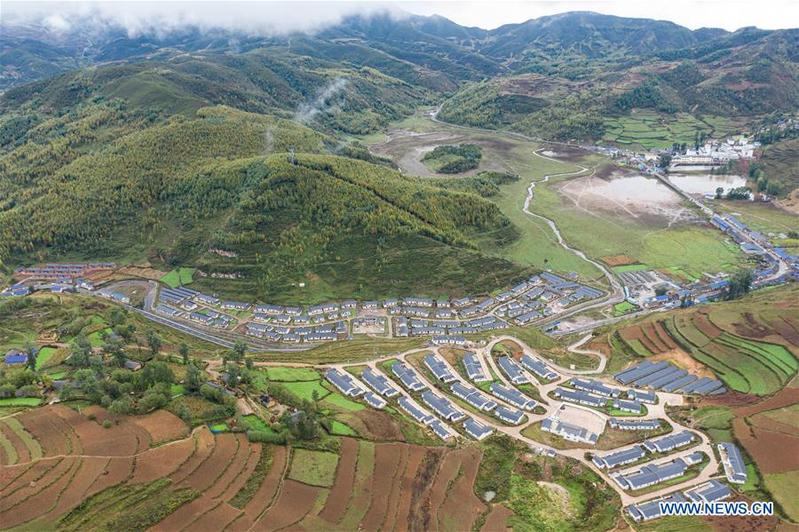


Qume Mutuhuo, a 52-year-old Yi ethnic woman, has a kouxian — a traditional mouth organ — that was her dowry. She would play it whenever she was homesick.
With the instrument in hand, Qume was married in a small village in the heartland of Liangshan Yi autonomous prefecture in southwest China's Sichuan province at the age of 20.

Aerial photo taken on Oct. 12, 2020 shows a resettlement area at Juexia village and Lietuo village of Riha town in Zhaojue county, Liangshan Yi autonomous prefecture, southwest China's Sichuan province. [File photo/Xinhua]
It took her and her relatives four hours to climb two mountains and arrive at the remote village Lamujue.
Since then, she had never gone far from the home until this year, when a relocation project finally enabled her family to bid farewell to the isolated village.
"I never expected that I would live in a fancy apartment," Qume said.
Over the past five years, China has relocated 9.6 million impoverished rural residents to more habitable areas, with most later lifted out of poverty, Tong Zhangshun, an official with the National Development and Reform Commission, said last week at a forum.
China aims to eradicate absolute poverty by 2020. Liangshan, home to 178,000 impoverished people, is one of the poorest regions in the country.
Qume's husband, Zhao Zaori, and his family have lived deep in the mountains for generations, never having risen out of poverty.
The couple earned a living by raising goats and pigs and toiling in the field, with meager yields from the barren land.
To send their six children to school, the couple saved every penny they could. "We don't want our children to be as poor as we are," Qume said.
When Qume's father-in-law suffered from appendicitis several years ago, Zhao and more than 20 villagers carried the old man for seven hours to a hospital in town for treatment. It was then that Qume heard about urban life from Zhao.
"People in town have decent apartments, with schools and hospitals at their doorsteps. Even their temperaments are different," Qume recalled, adding that she was so thrilled that she could become one of them.
Partly funded by the government, the family moved to a three-bedroom apartment near the county seat in June at their own cost of only 10,000 yuan (about US$1,496). The county government has offered a television set, washing machine and 1,000 yuan as furniture subsidy.
At their new community, the government has offered subsidies as well as low-interest loans to help with their employment and support them to join in cooperatives.
Qume now sows socks for a traditional Yi embroidery cooperative, earning some 100 yuan a day. The couple also harvested over 1,000 kg of potatoes, 350 kg of buckwheat, and some corn from their original farmland.
"The crop field is too far, so I'll lease it next year and find a job here in town," Zhao said, adding that they plan to retire after their children graduate from college.
Three of their children have entered university, including two in medical college. Their youngest daughter, 17, is now in senior high school.
"I hope my children can become doctors, partly because of appendicitis that almost killed my father in the village," Zhao said.
On the last evening before relocation, when villagers invited her to perform, Qume took out the mouth organ that she had not played for a long time.
"The music I played is about leaving home, and also about the expectation of a brand new future," she said.
